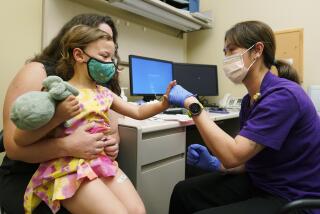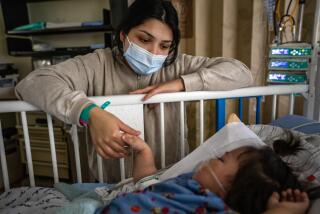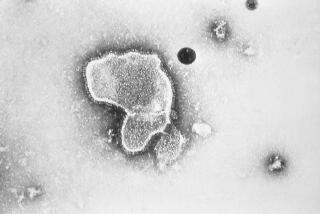Pediatricians Ill-Suited for Crises, Study Finds : Medicine: Report recommends going to a hospital for emergencies such as an asthma attack or a head injury.
- Share via
The majority of pediatricians are not fully prepared to deal with emergencies such as an asthma attack or head injuries, and in such crises, parents should take their children to hospital emergency rooms rather than the doctor’s office, according to a study released today in the journal Pediatrics.
Only half the pediatricians who participated in the nationwide survey reported having plans for managing life-threatening emergencies in their offices. Fewer than half, 43%, said their offices were stocked with the equipment and drugs needed to treat emergency cases.
The study, which was conducted by Johns Hopkins Medical School and involved 1,000 non-hospital-based pediatricians throughout the United States, should not “in any way” be viewed as an indictment of the pediatric profession, said the study’s lead author, Dr. Paula J. Schweich, former director of the emergency room and outpatient pediatric care at Johns Hopkins and now an emergency room doctor in Seattle.
What the study does indicate, Schweich said, is “the importance of calling 911” after any potentially serious injury or illness and “getting a youngster to an emergency room where there is likely to be the equipment and drugs needed to treat life-threatening problems.”
In comparison to doctors who treat adults, pediatricians appear to be better prepared to deal with emergencies in their offices. According to a much smaller survey conducted in Michigan and published in the Journal of Emergency Medicine in 1986, only 11% of family practitioners and other physicians had adequate equipment to treat common office emergencies, such as severe allergic reactions, chest pains, shortness of breath, seizures, shock, syncope or fainting spells.
Still, the Johns Hopkins study found, there are many potentially life-threatening problems experienced by children that most pediatricians are not prepared to handle outside a hospital setting.
Among the most common are meningitis (an inflammation of the membranes that cover the brain and spinal cord), acute asthma attack, severe dehydration, seizure, head trauma, epiglottiditis (a potentially fatal infection of the flap of cartilage at the back of the tongue that closes off the windpipe during swallowing), anaphylaxis or shock caused by a bee sting or other severe allergic reaction, and cardiopulmonary arrest.
The majority of pediatricians, 61%, said they were equipped to deal with severe dehydration, whereas only a handful, 11%, said they were prepared to manage cardiac arrest.
Those who were most likely to be prepared for emergencies worked in health maintenance organizations or large group practices. Those who had the fewest drugs and the least amount of equipment tended to work alone or in small group practices, the study found.
Those pediatricians who were most confident that they could handle emergencies were ones who had the most equipment and who had most recently completed their training or who had taken an emergency refresher course.
While cautioning that “confidence in managing an illness is not synonymous with competence,” the authors of the study nonetheless said refresher courses should “become part of the pediatrician’s regular continuing education.” The authors called for “further guidelines” for equipment for the pediatric office to “help ensure a quick and prepared response by the private practitioner when a severely ill child appears in his or her office.”
Despite their findings, Schweich cautioned that parents should not choose a pediatrician solely or even partially on the basis of his or her ability to treat life-threatening problems because such emergencies are extremely rare and are clearly handled best by paramedics and hospital emergency room personnel.
“The best way to find a good doctor is to ask your friends for one who has a good reputation. The most important thing is to find a doctor you trust . . . and one who is accessible,” Schweich said.
To be a good doctor, a pediatrician must not only be accessible by car or bus but also be readily available by phone. “We get a lot of calls in the (emergency room) from people who can’t get in touch with their own physicians, which is not the way the system was designed to work,” Schweich said.
In his 15 years of practice at 10th Street Pediatrics in Santa Monica, Dr. Jeffery Wasson said he had seen few life-threatening emergencies at the office, although the four-doctor practice is prepared for a full range of emergencies, including cardiac arrest.
Echoing the view of many pediatricians, Wasson said he would never advise parents to bring a child who was in serious danger--unconscious or unable to breath--to any doctor’s office. “That’s what the paramedics and emergency room doctors are there for,” he said.






